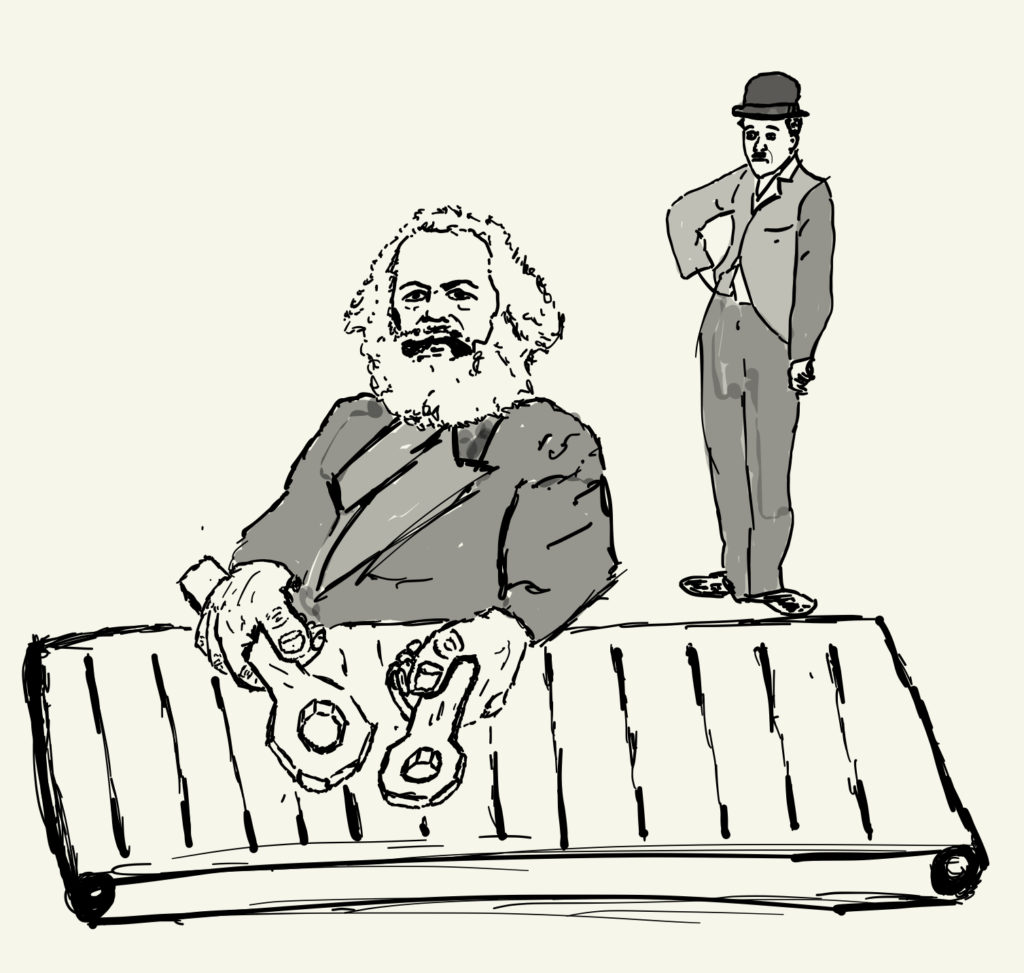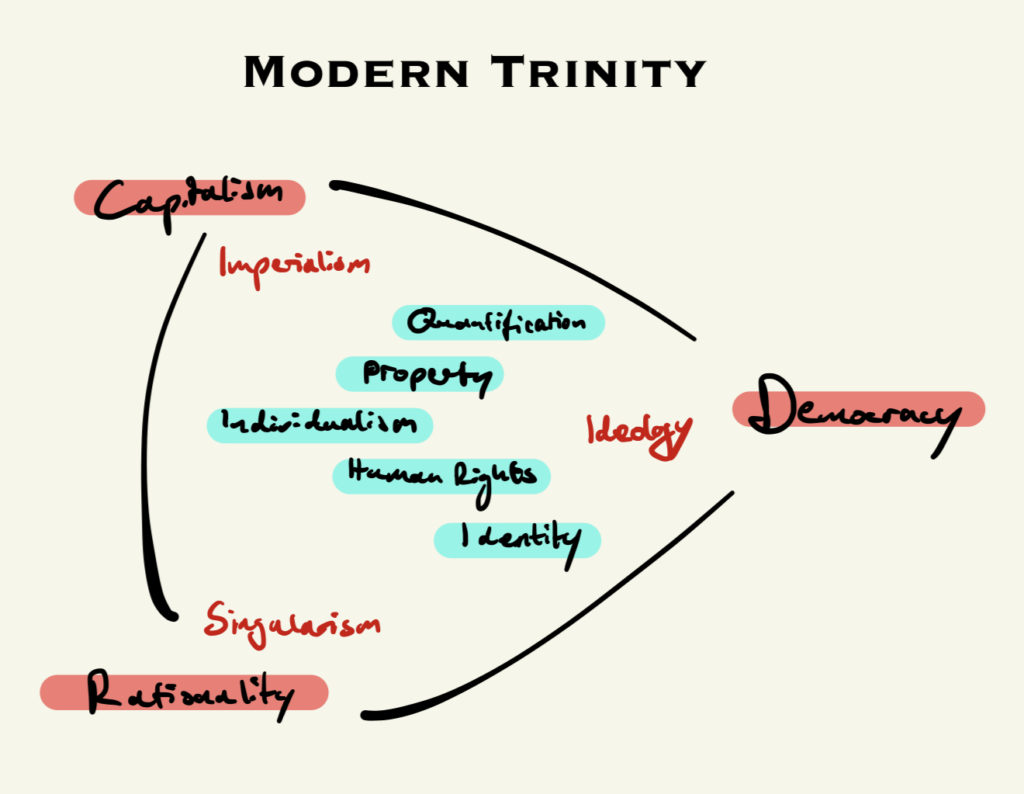+++ English Version below +++
(4) Zusammenhang zwischen Kapitalismus & Rationalität
Das Paradigma der Rationalität bildet das dominierende Denkmuster der westlichen Moderne. Der Artikel beschäftigt sich mit dem Zusammenhang zwischen Kapitalismus und dem rationalen Denken und problematisiert den unreflektierten Individualismus. Das Bild der Modernen Trinität aus Rationalität, Kapitalismus und Demokratie soll zum Denken anregen.
Rationales Denken in a Nutshell
Zur Erinnerung, rationales Denken geht davon aus, dass es eine objektive, statische, kausale, logische, universelle Welt gibt. Das rationale Denken konstruiert einen Dualismus zwischen der wahren Realität als Erscheinung (Appearance) und der transzendentalen Realität als Idee oder Ideal der Welt. Aus dem rationalen Denken resultiert ein eurozentristischer Idealismus, also eine unersättliche Suche nach der universellen Wahrheit hinter den Dingen der Welt. Historisch gesehen geht dieses rationale Denken mit einer imperialistischen Tendenz der Missionierung fremder Kulturen einher.
Das rationale Denken reduziert die Komplexität der Realität(en), indem es auf der äußerst ehrgeizigen Hypothese basiert, dass nur eine universelle sowie objektive Welt existiert. Des weiteren setzt das rationale Denkmuster eine gewisse Linearität voraus; Wissenschaftler:innen gingen in der Strömung des Evolutionismus davon aus, dass Kulturen sich linear sowie zielorientiert entwickeln. Einerseits werden Objekte unabhängig von ihrem Kontext isoliert betrachtet. Andererseits werden subjektive Faktoren, wie Position, Perspektive, Ausschnitt und Interpretation von Informationen, geleugnet. Rationalität in der Wissenschaft ist daher nicht progressiv.
Kapitalismus & Rationalität
Nicht nur können bestimmte Ähnlichkeiten und Korrelationen zwischen der rationalen Denkweise und dem Kapitalismus identifiziert werden, sondern beide sind auf vielfältige Weise miteinander verbunden und beeinflussen sich gegenseitig. Diese Verbindung wird bereits in den Anfangsstadien der Moderne und der Industrialisierung deutlich, als beide Konzepte gleichzeitig aufkamen. Während sich der Kapitalismus erfolgreich als globales Wirtschaftssystem etabliert hat, spielte das rationale Denken eine entscheidende Rolle bei der Legitimierung, Konsolidierung und Förderung dieses Systems.

Erstens besteht eine wechselseitige Verbindung zwischen der reinen Vernunft als Ergebnis der selbstverschuldeten Unmündigkeit der Menschheit und dem Kapitalismus, in Verbindung mit dem Prozess der menschlichen Emanzipation. Die rationalistische Denkweise bietet eine strukturelle Grundlage für die Emanzipation des Individuums, während der Kapitalismus das Aufkommen eines neuen Paradigmas persönlicher Freiheit und autonomer Handlungsfähigkeit ermöglicht. Darüber hinaus erzeugt die Emanzipation der Menschheit einen Rückkopplungsmechanismus, der sowohl den Rationalismus als auch den Kapitalismus beeinflusst: Sie wirkt sich auf den Rationalismus aus, indem sie seine Ausrichtung formt, und beeinflusst gleichzeitig den Kapitalismus, indem sie ein Umfeld fördert, das förderlich ist für die Entfaltung individueller Genialität und Eigeninitiative.
Zweitens, im Kontext des Kapitalismus und der reinen Vernunft wird das Konzept der Menschheit als Agent der Kreativität betrachtet, geleitet von theologischen Prinzipien. Individuen setzen ihre Fähigkeiten, Ideen, Rationalität und Arbeit ein, um wirtschaftlichen Wohlstand zu erlangen. Diese Verbindung zwischen Kapitalismus und dem christlichen Paradigma wird durch Max Weber in seinem bemerkenswerten Werk „Die protestantische Ethik und der Geist des Kapitalismus“ (Weber 2005) untermauert.
Drittens manifestiert sich der mit dem Kapitalismus verbundene gesellschaftliche Wandel als ein Übergang von kollektivistischen sozialen Strukturen, die von unbestimmten sozialen Normen geprägt sind, zu individualistischen Strukturen, die von strengen rechtlichen Rahmenbedingungen gelenkt werden. Dieser Übergang zeigt sich in der Entwicklung des kapitalistischen Systems und verdeutlicht den Einfluss des Kapitalismus auf soziale Konventionen und institutionelle Arrangements. Darüber hinaus belegt der Wandel, sei es von vagen Ritualen zu orthodoxen Vorschriften oder von beziehungsorientierten sozialen Strukturen zu bürgerlichen Arrangements, die Dominanz des Denkens zweiter Ordnung.
Viertens, im Kontext des Kapitalismus und des rationalen Denkens, besteht die Bestrebung, die Natur als Ressource zu objektivieren und zu quantifizieren. Die Natur wird als eine Entität wahrgenommen, die für wirtschaftliche Vorteile ausgebeutet und genutzt werden kann.
Fünftens verfolgen sowohl das rationale Denken als auch der Kapitalismus das gemeinsame Ziel, durch die Umsetzung universeller Prinzipien der globalen Organisation Einheit zu erzielen, die sich in logischen Konzeptualisierungen und dem Geldsystem manifestieren. Diese Vereinheitlichung schafft eine gemeinsame Grundlage, die einen systematischen Diskurs ermöglicht, der eine deduktive, logische Erzeugung von Wissen begünstigt, alternative Perspektiven jedoch vernachlässigt. Darüber hinaus etabliert sie ein globales System ökologischer Beziehungen, das mit Schulden verknüpft ist und nach marxistischer Auffassung den Kolonialismus abgelöst hat (De Ploeg 2022).
Tatsächlich besteht eine bedeutende Verbindung zwischen diesen Konzepten, insofern dass Individuen, die im Kapitalismus tätig sind, dazu neigen, das aristotelische primäre semantische Feld des Materialismus zu akzeptieren (Hall & Ames 1995, S. 95-96), das auch das rationale Denken umfasst.

Problematisierung des Individualismus
Individualismus fühlt sich super an. Seit der Emanzipation der Menschen in der europäischen Aufklärung als Human Beings gewinnt das Individuum neue Rechte und neue Verantwortungen. Doch können wir als Individuen unseren Verantwortungen überhaupt gerecht werden? Es gibt mitunter zwei Hauptprobleme im Individualismus.
(1) Die westliche Wissenschaft betrachtet die Realität durch die Linse des Individualismus. Objekte werden unabhängig von ihrem Kontext isoliert untersucht. In den westlichen Kulturwissenschaften vernachlässigen Wissenschaftler:innen das Verhältnis zwischen einem Individuum und seiner Umwelt. Alternativ schlägt der normative Ansatz „Yidoubufen“ der chinesischen Wissenschaften vor, dass Subjekte / Objekte in Relationen zueinander als Netzwerk begriffen werden sollen. Eine Person existiert also nicht unabhängig von ihrem sozialen Kontext.
(2) Der Individualismus geht davon aus, dass es unbegrenzte Ressourcen auf unserem Planeten gibt. Die Priorisierung individueller Rechte steht jedoch im Konflikt mit der praktischen, materiellen Umsetzbarkeit dieser Rechte. Zum Beispiel müssten im Kontext des Klimawandels natürliche Ressourcen gerecht auf die Weltbevölkerung verteilt werden. Da der weltweite Wohlstand und Konsum weiterhin steigen, liegt der Fokus allein auf der Umsetzbarkeit des Individualismus, ohne die Notwendigkeit einer ethischen Debatte über Konzepte wie „Fairness“ oder „Verteilungsgerechtigkeit“. Daher würde eine fortschrittliche Form des Individualismus ohne Nachhaltigkeitsreform an planetaren Grenzen stoßen.
Subjektive Schlussgedanken – die Moderne Trinität

Die Moderne Trinität aus Rationalität, Kapitalismus und Demokratie bilden drei Grundpfeiler der westlichen und vieler anderer Nationalstaaten. Oft sind die Komponenten der Trinität die beste Möglichkeit unseres Zusammenlebens. Oft gibt es jedoch strukturelle Probleme, die uns oft nicht immer bewusst sind.
Diese Trinität spiegelt sich in vielen Sphären des Lebens wider. Zum Beispiel werden insbesondere (Forschungs-)Ergebnisse der Natur- und Sozialwissenschaften für kommerzielle Zwecke verwendet und tragen somit zur Reproduktion des kapitalistischen Systems bei. Gegenüber der Kommodifizierung, Kommerzialisierung und ökonomischen Entwicklung lassen sich die Kulturwissenschaften einordnen, als Disziplinen, die unter anderem auf kulturelle Prioritäten aufmerksam machen und die Art und Weise des Denkens reflektieren.
Es bleiben die Spannungen zwischen der Rationalität des Kapitalismus und der transkulturellen Prioritäten. Wenn das transzendentale Ideal hinter den Dingen in unserer Welt den monetären Wert der Dinge repräsentiert, dann sollten wir alle BWL studieren.

+++ English Version +++
Investigating the Relationship between Capitalism and Rationality
The paradigm of rationality constitutes the prevailing cognitive framework of Western modernity. This article delves into the correlation between capitalism and rational thought while also critiquing unexamined individualism. The concept of the modern trinity comprising rationality, capitalism, and democracy is intended to stimulate contemplation.
Rational Thinking in a Nutshell
As a reminder, rational thinking assumes the existence of an objective, static, causal, logical, universal world. Rational thinking constructs a dualism between the true reality as appearance and the transcendental reality as the idea or ideal of the world. From rational thinking emerges an Eurocentric idealism, characterized by an insatiable quest for the universal truth behind the things of the world. Historically, this rational thinking has been accompanied by an imperialistic tendency to evangelize foreign cultures.
Rational thinking simplifies the complexity of reality(-ies) by relying on the highly ambitious hypothesis that only a universal and objective world exists. Furthermore, the rational thought pattern presupposes a certain linearity; scientists, within the current of evolutionism, assumed that cultures develop in a linear and goal-oriented manner. On one hand, objects are examined in isolation from their context. On the other hand, subjective factors such as position, perspective, scope, and interpretation of information are denied. Rationality in science, therefore, does not align with progress.
Capitalism & Rationality
Not only certain similarities and correlations can be identified between the rational mode of thinking and capitalism; both are interconnected and mutually influence each other in various ways. This connection becomes apparent as early as the initial stages of modernity and industrialization when both concepts emerged concurrently. While capitalism has successfully established itself as a global economic system, rational thinking has played a crucial role in legitimizing, consolidating, and propelling this system forward.

Firstly, there exists a reciprocal association between pure reason as an outcome of humanity’s self-imposed immaturity and capitalism, in conjunction with the process of human emancipation. The rationalist mode of thinking provides a structural foundation for the emancipation of individuals, while capitalism facilitates the emergence of a novel paradigm of personal liberty and autonomous agency. Moreover, the emancipation of humanity engenders a feedback mechanism that influences both rationalism and capitalism: it impacts rationalism by shaping its trajectory, and simultaneously influences capitalism by cultivating an environment conducive to the cultivation of individual ingenuity and proactivity.
Secondly, within the realms of capitalism and pure reason, the concept of humanity is viewed as an agent of creativity, guided by theological principles. Individuals employ their abilities, ideas, rationality, and labor to attain economic prosperity. This association between capitalism and the Christian paradigm is substantiated by Max Weber in his notable work, „The Protestant Ethic and the Spirit of Capitalism“ (Weber 2005).
Thirdly, the societal transformation linked with capitalism manifests as a shift from collectivist social frameworks characterized by indeterminate social norms to individualistic structures governed by stringent legal frameworks. This transition is evident in the evolution of the capitalist system, elucidating the influence of capitalism on social conventions and institutional arrangements. Furthermore, the shift, whether from ambiguous rituals to orthodox regulations or from relationship-oriented social structures to bourgeois arrangements, substantiates the dominance of second-order problematic thinking.
Fourthly, within the realm of capitalism and rational thought, there exists a pursuit of objectifying and quantifying nature as a resource. Nature is perceived as an entity that can be exploited and utilized for the purpose of attaining economic advantages.
Fifthly, both rational thought and capitalism share a common objective of achieving unity through the implementation of universal principles of global organization, which are manifested in logical conceptualizations and the monetary system. This unification establishes a shared foundation, enabling a systematic discourse that favors a deductive, logical generation of knowledge while disregarding alternative perspectives. Additionally, it establishes a global system of ecological relationships intertwined with debt, which, according to Marxists, has superseded colonialism (De Ploeg 2022).
Indeed, there exists a significant linkage between these concepts to the extent that individuals operating within capitalism tend to embrace the Aristotelian primary semantic field of materialism (Hall & Ames 1995, pp.95-96), which encompasses rational thinking as well.

Problematic Aspects of Individualism
Individualism feels empowering. Since the emancipation of humanity during the European Enlightenment as human beings, the individual has gained new rights and responsibilities. However, are we even able as individuals to live up to our responsibilities? Here are two main issues associated with individualism.
(1) Western science views reality through the lens of individualism, isolating objects from their context for examination. In Western cultural studies, scholars often neglect the relationship between an individual and their environment. Alternatively, the normative approach of „Yidoubufen“ in Chinese sciences suggests that subjects/objects should be understood in relation to each other as a network. This implies that a person does not exist independently of their social context.
(2) Individualism presupposes the existence of limitless resources on our planet. The prioritization of individual rights conflicts with the practical, material feasibility of their realization. For instance, in the context of climate change, the equitable allocation of natural resources relative to the world’s population would be necessary. As global prosperity and consumption continue to rise, the focus here lies solely on the feasibility of individualism, without the need for an ethical debate regarding concepts like „fairness“ or „distribution justice.“ Thus, a progressive form of individualism, without sustainability reform, would encounter planetary limits.
Subjective Concluding Thoughts – The Modern Trinity

The modern trinity of rationality, capitalism, and democracy constitutes the three fundamental pillars of Western societies and many other nation-states. Frequently, the components of this trinity represent the most effective means of our coexistence. Nevertheless, structural issues often exist, which are not always readily apparent to us.
This trinity is reflected in many spheres of life. For instance, (research) findings from the natural and social sciences are often employed for commercial purposes, thereby contributing to the perpetuation of the capitalist system. In contrast to commodification, commercialization, and economic development, cultural studies can be positioned as disciplines that draw attention to cultural priorities and reflect on modes of thought.
Tensions persist between the rationality of capitalism and transcultural priorities. If the transcendental ideal behind things in our world represents the monetary value of those things, then we should all be studying business administration.

Literature
- De Ploeg, Chris Kaspar (2022): Imperialism is at war with our planet – and we need to stop it. https://mronline.org/2022/09/29/imperialism-is-at-war-with-our-planet-and-we-need-to-stop-it/ [accessed on 16.06.2023].
- Hall, David L. and Roger T. Ames (1995): ANTICIPATING CHINA. Thinking through the Narratives of Chinese and Western Culture. STATE UNIVERSITY OF NEW YORK PRESS.
- Keilhack, Felix: Rationality as a Challenge for Relativism. Die Kulturschock. https://diekulturschock.de/2023/07/22/rationality-as-a-challenge-for-relativism/ [accessed on 27.08.2023].
- Weber, Max (2005): The Protestant Ethic and the Spirit of Capitalism. Routledge. Taylor & Francis e-Library. London and New York.

Autor & Redaktion: Felix Keilhack (LMU)


